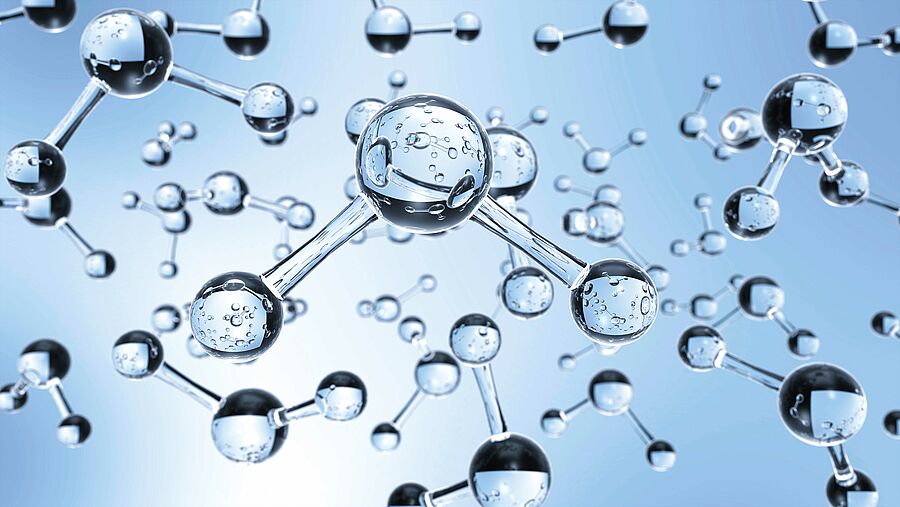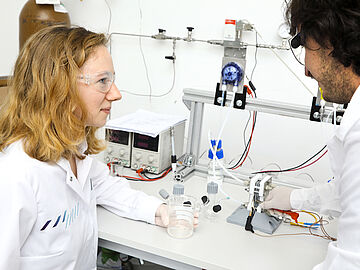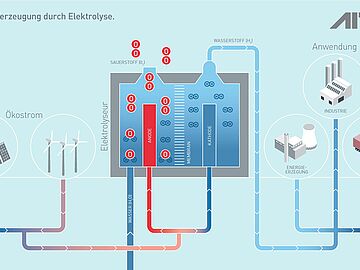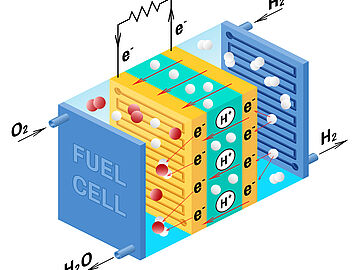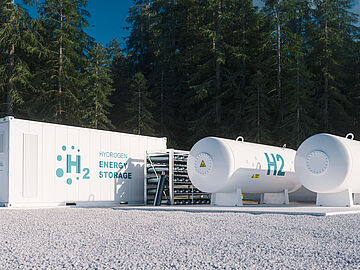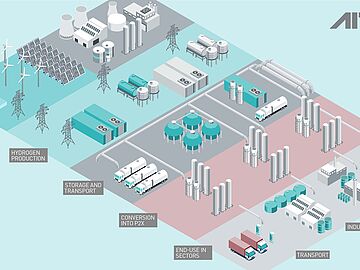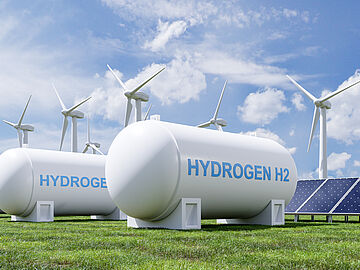Areas of application and fields of use
In principle, hydrogen can be used in a wide range of applications. The International Energy Agency has defined two categories of applications for hydrogen as part of the Global Hydrogen Report 2023:
- Traditional applications: Refining; feedstock for the production of ammonia, methanol and other chemicals; and as a reducing agent for the production of direct reduced iron (DRI) using fossil-based synthetic gas; use of hydrogen in electronics, glass manufacturing or metal processing.
- Potential new applications: Use of hydrogen as a reducing agent in 100% hydrogen DRI, mobility and transportation, production of hydrogen-based fuels (such as ammonia or synthetic hydrocarbons), upgrading of biofuels, high-temperature use in industry, electricity storage and generation, and other applications with more efficient and lower-emission alternatives.
Focus areas in research and development
The AIT is a leader in research, development, and innovation in the field of hydrogen technologies. Our focus is on improving the efficiency and reliability of existing technologies as well as developing new, high-performance materials. In this context, we are deeply committed to reducing costs and extending the lifespan of hydrogen systems to enhance their market acceptance. Key areas of our research include advancing electrolysis technologies, particularly proton exchange membrane technology, exploring new materials, and optimizing recycling techniques to promote the circular economy in the hydrogen sector.
Economic considerations in the energy sector
The AIT comprehensively addresses energy-related issues concerning the use and integration of hydrogen technology. A central focus is the development of scenarios for decarbonizing energy infrastructure and selected industrial sectors. These scenarios support the formulation of long-term strategies to reduce emissions and ensure a sustainable energy supply.
Another key focus is the analysis of hydrogen-specific technological development pathways. This includes examining technological advancements and their impact on future market design. These analyses are crucial for anticipating market trends and shaping regulatory frameworks accordingly.
The validation of business models based on the energetic and material utilization of hydrogen-based technologies and systems is also a fundamental part of AIT's work. This involves evaluating the economic potential of these technologies and developing concepts to help companies benefit from hydrogen use.
Moreover, the AIT conducts (impact) analyses of energy policy frameworks to assess the role of hydrogen as an energy carrier in future energy policies. These analyses provide valuable insights for decision-makers and support the development of policy measures to promote hydrogen technology.
Finally, the AIT works on developing optimization concepts for the deployment of plants. The aim is to enhance the economic viability of hydrogen-based systems, particularly in combination with other renewable energy systems such as photovoltaics (PV), wind energy, batteries, and power-to-heat (P2H). Existing regulatory frameworks are also considered to maximize the utilization of these technologies.
The AIT's energy-related considerations for hydrogen technology include:
- Development of scenarios for decarbonizing energy infrastructure and selected industrial sectors
- Analysis of hydrogen-specific technological development pathways and relevant market design
- Validation of business models based on the energetic and material utilization of hydrogen-based technologies and systems
- (Impact) analyses of energy policy frameworks for hydrogen as an energy carrier
- Development of optimization concepts for plant deployment to increase economic viability in combination with systems (PV, wind, battery, P2H) and existing regulatory frameworks
Hydrogen as part of the global energy system
The transformation of the global energy system is fundamental to combating climate change and contributes to enhancing energy security. Achieving climate neutrality requires the use of clean energy sources such as wind, solar, water, and geothermal power. Additionally, energy carriers like hydrogen and its derivatives (e.g., ammonia, methane, or methanol) are essential. These carriers can balance fluctuations in the availability of renewable energy and enable the decarbonization of sectors where emission reductions are particularly challenging.
Green hydrogen - what makes it “green”?
Green hydrogen is produced in a sustainable and environmentally friendly manner. Unlike other types, such as gray or blue hydrogen, green hydrogen is generated exclusively using renewable energy sources like wind, solar, or hydropower. This is achieved through a process called electrolysis, in which water (H₂O) is split into its components, hydrogen (H₂) and oxygen (O₂), using electricity.
The term “green” refers to the climate-neutral production process, as neither fossil fuels are used nor greenhouse gases like CO₂ are emitted during production. Green hydrogen is considered a key element in the energy transition, offering a sustainable alternative to fossil fuels and being applicable across various sectors, including industry, mobility, and energy supply.
Its unique ability to store energy long-term without losses and to make it usable again on demand and emissions-free makes green hydrogen an indispensable building block for a climate-friendly future.
Key to the transformation of the global energy system
Hydrogen is an integral part of transforming the global energy system and a cornerstone of the energy and industrial strategies of many economies, including Austria. Particularly in energy conversion and storage, hydrogen holds significant potential. The energy stored in molecules like hydrogen or its derivatives does not suffer from self-discharge (energy loss) over time. Gaseous hydrogen has an extremely high gravimetric energy density, and the energy can later be regenerated in fuel cells or through harmless combustion. Furthermore, hydrogen and its derivatives can be integrated into existing distribution systems for gas and oil.
Despite these favorable characteristics and the current momentum, several major challenges remain to unlock the potential of low-emission hydrogen. Hydrogen can only be considered a “green” energy carrier if its production is not associated with the release of greenhouse gases. However, the approximately 100 million tons of hydrogen currently produced and consumed worldwide each year are almost exclusively derived from fossil fuels. While political efforts to increase the share of low-emission hydrogen production remain strong, the adoption and application of such hydrogen are not progressing quickly enough.
Value chain
Green hydrogen offers enormous potential for decarbonization and long-term energy storage. Despite the existing challenges in terms of efficiency and costs, the technology is a key component of the energy transition. Through targeted investments and technological developments in production, transportation and storage, hydrogen can play a central role in a climate-neutral future in the coming decades.
Decarbonization through the use of hydrogen technologies
Although hydrogen has not yet been widely used in many of these (new) applications, either because it has not been competitive with established fossil fuels and other low-emission technologies or because the technologies for end use are not yet mature, the need for decarbonization is likely to lead to increased use, especially in sectors where emissions are either difficult to reduce or other low-emission technologies are not available or very difficult to implement.
Based on its strategic orientation and many years of expertise, the AIT focuses application-oriented research and development activities on three areas:
System integration for infrastructure & industry
- Techno-economic system analysis for integration into industry and infrastructure
- Conceptualization and technical design of hydrogen-based systems using digital models ("Digital Twin").
- Technology-specific support for procurement processes of hydrogen systems.
- Analysis of existing technologies and systems available on the market.
- Investigation of large-scale grid serviceability and flexibility of hydrogen-based systems (e.g., fast-response electrolyzers for demand response) in distribution and transmission networks.
- Design and interoperability testing of ICT interfaces.
Power to X: Key technology for the energy transition
Power-to-X (also known as Power2X) is an innovative technology that plays a central role in the energy transition. It involves converting surplus renewable electricity, primarily from photovoltaic and wind power plants, into other energy sources. The “X” stands for various end products, such as hydrogen (power-to-hydrogen), synthetic fuels (power-to-fuel) or chemical raw materials (power-to-chemicals). These versatile applications offer a solution for the storage and use of renewable energy and support the path to a CO₂-neutral future.
